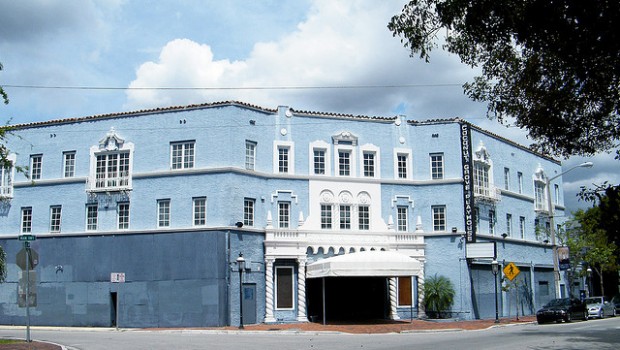The Coconut Grove Playhouse. Photo courtesy of Creative Commons’ flickr.
Simone Garvey-Ewan/Staff Writer
Plans to revive Coconut Grove Playhouse are moving forward after Miami-Dade County and the University cleared up the facility’s debts on Jan. 15, granting them control of the building which would have otherwise been put up for sale.
This is a victory for the partners who hope to revive the building as an architectural and historical landmark.
The University will invest zero dollars and will instead offer expertise and personnel to the project in return for learning and internship opportunities for students, according to Dean Brian Schriner of the College of Architecture and the Arts.
“This creates all kinds of unique opportunities for our students in the form of internships so they’re job-ready when they graduate for not just performance but stage management, costuming, lighting and set design,” Schriner said.
The University and the county will be co-lessees of the facility with GableStage managing the theater. The University’s theater department will also be involved in the project, but GableStage will serve as the artistic director of the playhouse. When GableStage is not in season, there will be opportunities for students to put on their productions and exhibit their work at community events.
“This is an opportunity to take students and all the talents we have and take them to the Grove to showcase what’s here,” said Amira Ajlouni, a senior architecture major.
[pullquote]“This creates all kinds of unique opportunities for our students in the form of internships,” said Brian Schriner of the College of Architecture and the Arts.
[/pullquote]
Senior Vice President of Finance and Administration and Chief Financial Officer Kenneth Jessell called the project a good business deal for the University in an earlier interview with student media.
Prior to the acquisition of the playhouse, Jessell confirmed that the county had already invested $20 million into the project.
“There was no source of funding previously,” he said. “This funding came from county bond issues associated with improving the quality of life in Miami-Dade County.”
A Board of Trustees Agenda and Finance Audit Committee report clarified that $5 million of these finances come from Convention Development Tax Bond proceeds, while $15 million comes from the Building Better Communities-General Obligation Bond program.
The partners hope to “establish the Coconut Grove Playhouse as a real important treasure to the community.”
“I think it’s inspiring to work outside in the city and have people other than the students see your work,” Ajlouni said. “I think this will work well both for the students and for the community.”
The playhouse’s history dates back to 1927 when it was designed as hub for the community by the architectural firm Kiehnel and Elliott. It was remodeled in 1954 under the architect Alfred Browning Parker and became Miami’s first live and legitimate theater. As reported previously by FIU student media, a Florida Theater On Stage article by Bill Hirschman noted that it was one of the leading regional theaters of the post-World War II era.
Last year, the state re-took ownership of the theater from a nonprofit group that closed operations in 2006 after administrative troubles and mounting debt. In August, Gov. Rick Scott and the Florida Cabinet approved FIU and Miami-Dade’s plan, giving them the Jan. 15 deadline to clear the property’s outstanding claims.
The University and the county are now in a 50-year deal with two 25-year renewal options.
–simone.ewan-garvey@fiusm.com






Be the first to comment on "University and county move forward with playhouse plans"